Emma McKeon: Being most successful Australian Olympian of all time hasn’t made me happier
Emma McKeon is the fastest woman in swimming and the toast of Australia after the Tokyo Games, but she says it hasn’t made her any happier.
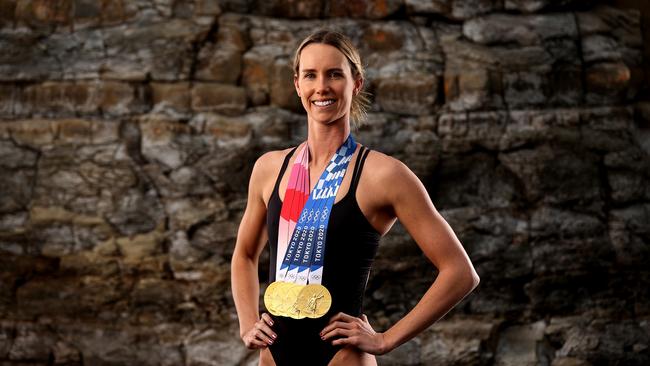
Lifestyle
Don't miss out on the headlines from Lifestyle. Followed categories will be added to My News.
Emma McKeon was born into a swimming family in Wol
She learnt to swim at the local swimming centre, which her parents ran.
Emma went to Tokyo expected to win medals. Not many expected her to return as Australia’s most medalled Olympian – ever.
Emma won seven medals, equalling the most by any female, in any sport, from any country, at a single Olympic Games, ever. Her tally after two Olympics is 11 medals: five of them gold, four of those gold in Tokyo. Ian Thorpe and Liesel Jones had held the record with nine Olympic medals. Emma now stands alone.
We spoke about expectation, relief, happiness and pressure. And as I did, I realised the fastest female swimmer in the world is one of the most humble people I’ve ever met.

HM: Emma, what is your first Olympic memory?
EM: Mine is being Sydney in 2000. I don’t remember much of the actual Olympics, but I remember being out and around Olympic Park, in the city where they have those big water fountains. I remember playing in them during those Olympics, but can’t really remember the events or the athletes. When it comes to the actual Olympics itself, it’s Athens, getting up early in the morning and watching on TV.
HM: You were five in Sydney, and nine watching Athens. You are in a unique scenario where your father and uncle had all been Olympians. Did you understand at early on what it all meant, and was the aspiration to be an Olympian too?
EM: I knew my parents had been good swimmers when I was young, but I didn’t realise the magnitude of the Olympics and what they had achieved by going to the Games. I never really contemplated being a swimmer as a profession.
HM: What were you thinking you might do?
EM: I wanted to work with the dolphins at Sea World!
HM: I still want to do that!
EM: Same! We watched the dolphin show there when I was younger, and as a result I wanted to become a marine biologist, and work with all the animals there.
HM: When did the mindset change, from working with dolphins to becoming the fastest female swimmer in the world?
EM: I dreamt of it, and as I got older, I went from dreaming about it, to actually believing in myself, and then knowing that I could achieve it. Early on, it was all just dreams. Then in time, after a lot of laps and hours and wins and losses and tears, you realise you are capable. But you only realise that after so much hard work has gone in. It’s a risk. It’s a risk to put that much hard work in, and maybe not get the result, not get to where you want to get to. You have to get more and more comfortable with taking all that risk, and putting everything on the line, and falling short.
HM: You must become comfortable with potential failure?
EM: That’s right, that’s exactly it. You have to be prepared to not succeed in something you desire, and what you really want, and still put it all on the line and risk that chance of failure – even if it is failing at the Olympic Games! Or not even getting to the Games after all of the years of work and application. There is a higher chance of failure, because it’s such a huge thing to be aiming for, which requires years of given training and sacrifice. But you need to be prepared to do it – and prepared to fall short. Having said all that, it’s quite easy to crumble under the pressure to perform given what you’ve put yourself through.

HM: The weight of expectation?
EM: Yeah. Leading into the Games, I was very aware of the pressure of performance, and some of it was put on by me, knowing what was expected. It is quite easy to crumble, but I wasn’t going to let that happen. I’d been to an Olympics before, so I knew what it was all about. I knew how big it is, and how big it feels when you’re there.
HM: How do you not let it happen? How did you ensure you performed so well?
EM: I was so determined to not let it happen to me. I had trained so hard, and I didn’t want to come away from the Olympics knowing that I’d missed that opportunity. Leading in I did a lot with my psychologist and came up with a lot of “what if” scenarios. I was prepared for whatever could come my way. I knew that whatever happened, I had a scenario to deal with it. Whatever came up, either produced by me or by external factors, I had a plan to go to that would get me to a good place.
HM: When you stood on the blocks, as a viewer, a supporter, I was anxious and nervous for you, and we’d never even met, I was just a proud Aussie fan. What were you feeling?
EM: Nervous! It’s easy to think of the result. You’re constantly thinking, “What time am I going to do? Where am I going to finish? What is the person next to me going to do?”. I’d had a lot of practice over the last 12 months, thinking that way, and just redirecting my mind back to my little process goals and my focus points. Once I had those, I was working on them every single day at training – my stroke, my skills, standing behind the blocks. I knew, especially in the 100m free, the race plan that I wanted to execute. I didn’t want to be too rushed, because at trials I rushed that first 50m, and that cost me on my second lap. The Olympics is about coming home strong. You want to be finishing off your race stronger than anyone else, so I wanted to have something left at the end. Once I got my first 50m done, I realised, “OK, that’s done, and now I can race”.
HM: Talk us through the focus points. You talk about coming home stronger, not rushing the first lap. Can you give us an insight into the focus points that you are thinking about?
EM: They start from the beginning of the day. When I’m on the bus, I’m focusing on listening to my music, and I play a game on my phone to distract myself and relax. On the morning of my 100m free final, I woke up at 5am. The final wasn’t until 11.30am!
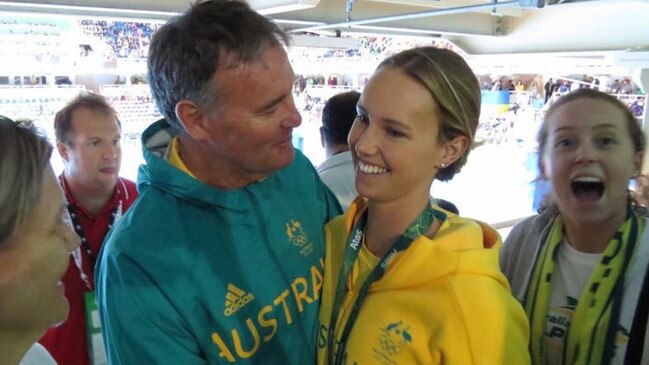
HM: What time do you normally wake up?
EM: My alarm was set for 7am. I woke up and thought, “Well, that’s the end of my sleep. I’m not going back to sleep now.” I knew that I’d had enough, I didn’t need much more than that, so I didn’t let it worry me. You need to keep being OK with scenarios so you don’t waste energy on things you can’t control. I went for a walk with Bohly (coach Michael Bohl), and we had a chat just to wake up and stay relaxed rather than just sitting in my room where you can start over-thinking.
HM: What about at the pool?
EM: Once I’m at the pool, I’m going through the same routine that I always go through with my dry land – listening to music and having a chat to people. Once I’ve warmed up, I have a chat to Bohly again. He knew that I’d prepared the best I had ever prepared, and I knew that too. He is a good coach to have in such a high-pressure environment. He is so relaxed, and he’s been there so many times before. You’ll never see him nervous, and that relaxes me. He said to me, “You’ve done everything you need to do. Just go out there, have fun, enjoy the moment and soak it all up.”
HM: Did you?
EM: To some degree. I was more nervous for my semi-final than my final. I knew I was capable of winning – all I had to do was stick to what I’d trained to do. Don’t rush the first 50m, and stay off the legs a bit so I had plenty left in the tank on my second 50m. I’d had the quickest second 50m all year, out of everyone that had been competing, so I knew that was where my strength would be. Once it’s over, you can look back. In the moment, I was nervous, but I was as relaxed as you could be going into an Olympic final.
HM: Do you find it extraordinary that there is no female in the world that can swim faster than you?
EM: Wow, no one has ever said it like that before. When you say that, and I think about it, it is pretty extraordinary. It’s what I hoped to be. I wanted to be the fastest in the world, so to finally be there … yeah, that is a cool feeling, to know all the hard work that I’ve put in has paid off.
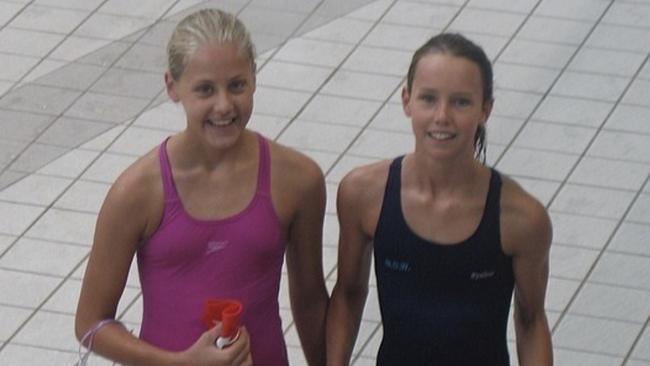
HM: For the best part of a decade, more, you’ve wanted to be where you are now. Are you where you thought you’d be, hoped you’d be, emotionally?
EM: Yeah, I think so. A little bit. Probably. It’s a good question. I don’t feel happier than before Tokyo. I am proud, and I keep having to remind myself that that’s what I did, but I still feel like exactly the same person. I’m relieved, and feel like I accomplished something pretty special, but luckily I was happy before the Games, and just as happy now. Having said that, there’s always going to be a bit of a down coming off an Olympics, coming off such a long build-up. My inclination is to feel: “What’s next?’ I’m trying to put that aside for now. I want to be proud of what I’ve done, and I am proud, but I want to have a pause for a bit.
HM: Ash Barty is good on this, and Ben Crowe has done a lot of work with her. It’s the “person versus performance”. She says, “If I win, I’m not a better person or a happier person, and if I lose, I’m not a worse person, and I shouldn’t be less happy.”
EM: Even before the Olympics, I always knew that achieving those kinds of things wouldn’t change who I was, but I was still expecting to feel something different. That is why I keep saying I don’t think it’s sunk in for me yet, I’m still expecting to feel something totally different. I’d never achieved it before, so I was expecting something huge. I don’t feel any different, I don’t feel like a different person, I don’t feel happier for having done it. It’s a separate kind of happiness.
HM: Becoming Australia’s most successful Olympian and equalling the greatest number of medals at an Olympics isn’t normally greeted with no fanfare, no crowds, quarantine and lockdown. Maybe that’s it?
EM: It’s been challenging. We came straight off racing one day in the Olympic finals, to getting on a plane, coming straight home, and going into Howard Springs in your own little room for a fortnight of quarantine. That’s quite a challenge. We have been training our whole lives, but especially for these Olympics, it’s been such a big lead-up, and such an emotional lead-up as well with the postponing, so to finish and go straight into your own little room has been hard. Coming back here, it’s been so nice to see my family. You want to go out and celebrate, and do normal things to let off some steam, but that’s just how it is now.
HM: Everything has a lack of emotion about it.
EM: That’s how I feel too.
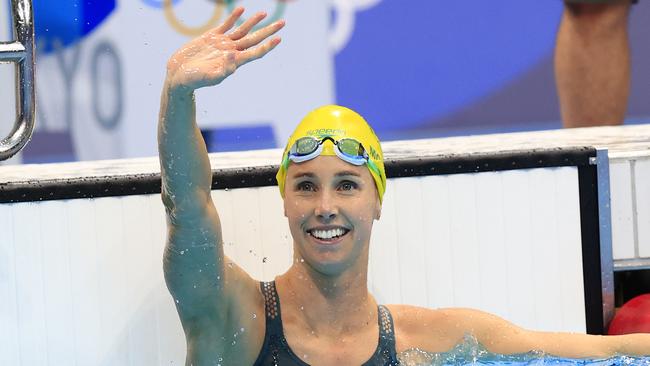
HM: Satisfied, but numb.
EM: Yep, that’s a great way to describe it. There is a numbness to everything, isn’t there? I just hope, for all of us, that is a temporary feeling.
HM: Let’s hope. Going back a little … in London, you just missed the team and you watched the best in the world do their thing as you were there as a spectator. Was that a turning point in what you realised needed to be done, and perhaps what you needed to do?
EM: Eventually it was, yeah. I was over there watching my brother David, but it’s funny: I still didn’t want to be a swimmer, I didn’t love the sport. I didn’t want to do what was required to be the best. In London, I knew Rio was going to be another four years away and I just didn’t like swimming enough to train for that four-year block. It took me a bit to come to the realisation that it’s hard to get to that level, and you have to just do things you don’t want to in order to achieve great things.
HM: You say you didn’t love swimming. Do you love swimming now, or do you just happen to be good at it?
EM: I love being good at it. Does that make sense? There are parts of swimming that I love, and parts that I don’t love.
HM: What do you love?
EM: I love pushing my body and putting in so much hard work to achieve something exceptional.
HM: What irks you?
EM: The repetition, and sometimes the mental side of things – the pressure I put on myself. That’s something I’ve had to deal with over the years. I have become a lot better at managing that. I don’t like early mornings, and sometimes it gets old. And having to make sure I’m eating enough, being on top of my sleep, not being able to see my family and friends when I want to in Wollongong. Equally, there is so much good that comes from it.
HM: With the pressure you put on yourself, does that manifest itself in anxiousness, dark days, down days? How do you manage the pressure you put on yourself?
EM: I have anxious days, I have days where I am doubting myself, and all kinds of doubts creep in when I’m feeling anxious. I have got better with it over the years. When I think back to Rio, my doubts were a lot bigger. I didn’t think that I could be the best, I didn’t think that I could go there and win. I thought I was capable of it, but I didn’t think I had exactly what it took to win. Over the last few years, I’ve got to a point where I know I can be the best, and I know I can do everything I need to be the best, and pull it off. But there are still days where I’m thinking: “What am I doing? Do I really want to put all of this in?” You’re constantly battling with those kinds of thoughts.
HM: So on that, when Simone Biles made her announcement, did you understand what she was feeling and thinking?
EM: I did. Absolutely …
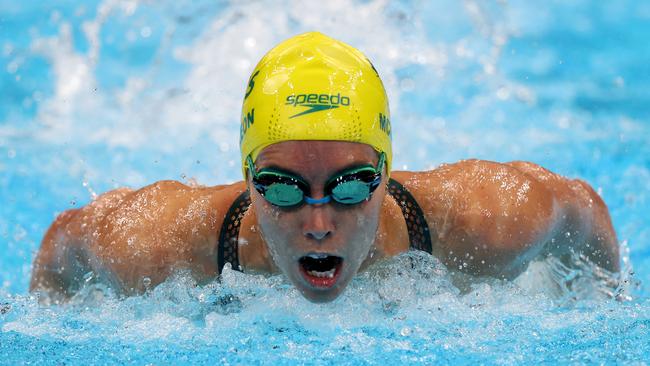
HM: … crazy pressure?
EM: So much pressure. She’d done so well in Rio, so she’s got added pressure and expectation on herself, and added pressure from the public and her country. It’s so easy for that to overwhelm you. Mental health affects everything, the way you’re thinking, the way you’re feeling – it affects everything. You must put your mental health first. I loved that she was brave enough to say: “I’m actually not OK.” It didn’t surprise me at all really. It was great.
HM: It was. What changed between Rio and Toyko where you went from thinking “I can’t compete” to “I am the best in the world”?
EM: Working more with Bohly and seeing the belief he had in me. I would be silly to not have that same belief he had. How much work he put into what we were doing, I wanted to live up to that as well, and invest in it and honour it. I’m not finished yet, but I knew that I wanted to finish my swimming career knowing I’d reached what I knew I could, and Bohly had me believing I could beat anyone.
HM: And you did. How was the village?
EM: It was good. Different to Rio, not being able to walk around as much. We’d go into the food hall, with masks and gloves on, get our food quickly, and sit down for 10 minutes before getting out as soon as you could.
HM: Were the Australians allowed to talk to the Americans, or was it completely isolated?
EM: You could talk, but you couldn’t stop and talk. You were considered a close contact if you stopped and spoke with someone. We were just rushing around the village all the time trying to get back to our rooms. We didn’t get to enjoy it like we did in Rio.
HM: Seven medals in Tokyo, four gold, including the 50m and 100m. What did you hope for in your wildest dreams?
EM: I knew I wanted to win gold in the 100m free, that’s what I’ve had my mind set on for the past two years. Honestly though, the results that I got are what I hoped for. After the 100m fly final, when I came third, I was initially stoked because I got a PB in an Olympic final. When I looked at the results and saw I was 0.13 seconds off winning, that gave me mixed emotions though! I was so close. I remember walking back into the village after Zac Stubblety-Cook won his gold medal in the 200m breaststroke, and I was chatting to him for a bit. I said, “What does it feel like?” He said, “It doesn’t feel real.” My 100m free might have been the next day, and I wanted that feeling that he had. Watching him do it and walking back to the Olympic village after he’d done it – I was very determined to do the same the next day.
HM: The 4x100m gold and world record seemingly set the whole tone of the Games, not only for the Dolphins, but for the Australian team.
EM: It always does, being in the first finals session. We always do very well. There’s a lot of pressure on us to win that one, especially after the trials we had. We had eight people in our final swim amazing times, so we had a strong field. It was the first gold medal, so it usually sets the team up for a good week. When we go back to the village, everyone from the other sports say it brings them a lot of energy, which helps them go and get started in their sports. The whole team did amazingly, so hopefully that played a part in the Australian success.
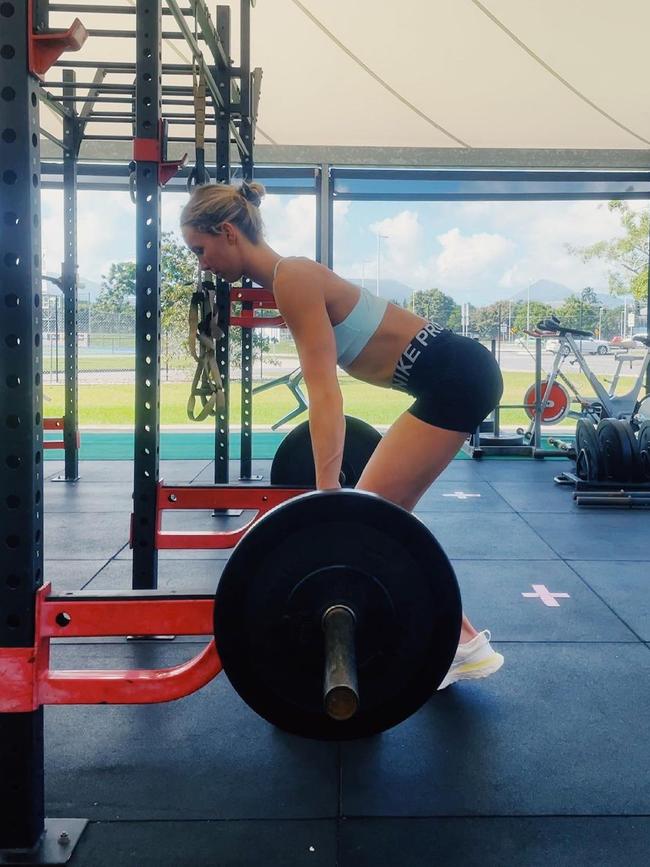
HM: It seems it did for sure. The 100m free was the one you wanted. Explain to me the last 25m, and then touching the wall. When do you know you’ve become the Olympic champion?
EM: I was so focused on what I was doing, it wasn’t until I touched the wall and looked at the scoreboard that I actually knew. Often you know, but I didn’t, so I touched, and looked and hoped! When you see your name there, it’s a mixture of a lot of things. It’s shock and happiness that I’ve finally got the result, and now I can enjoy the outcome of it. I thought a lot about my coach, Bohly; I thought about my family back home. Straight after the race I Facetimed them, and they were jumping around everywhere!
HM: Nice to be the best swimmer in the family when you’ve got a two-time Olympic father, two-time Olympic brother, two-time Olympic uncle, and a mother who’s been to the Comm Games.
EM: David would always say to me, “I’ve been to two Olympics. Wait until you’ve done that.” Now I have!
HM: And now you’re the most successful Australian Olympian – of all time.
EM: It’s weird to think I’m the most successful Australian Olympian. That’s not something I set out to do. To have you say that to me, it’s just a strange feeling.
HM: No female has ever won more than seven medals at a Games.
EM: No female in the world?
HM: Yes. Did you not know that?
EM: No. I thought a gymnast had more?
HM: You’ve equalled the gymnast. Maria Gorokhovskaya – no one has ever won more than you and she.
EM: Oh. Wow. Things like that haven’t sunk in. That’s just how it is. It’s not something I planned to do!
HM: You picked up seven, which makes a total of 11.
EM: It’s pretty crazy when you say it. The Tokyo medals were sitting in front of the TV the other night – I’d gone to bed, and Dad apparently said, “Maybe we should just put them away somewhere safe”, thinking something could happen to them overnight.
HM: There’s some chat around what’s going to happen in Wollongong. Is renaming it McKeonville too big a stretch?
EM: Yep. I don’t want that!
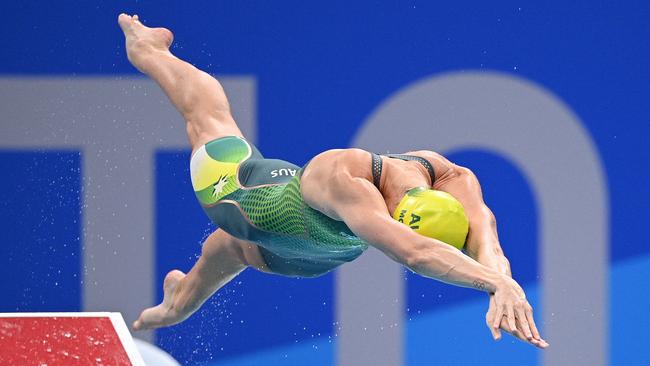
HM: They’ve spoken about a statue, a water feature, renaming the town. If you were the mayor, what would you do?
EM: (laughs) Honestly, if I was the mayor, I would do nothing. Nothing would make me very happy … I’m not one for the attention!
HM: Somebody said to me you are the humblest Olympic champion they have ever met, but the hardest working. How would you describe yourself?
EM: I would say I work hard, and I like to stand behind the blocks believing that I have worked harder than everyone else. I know that I have put everything into it, in and outside of the pool. When it comes to being humble, I knew from a young age that it was the main quality that I wanted to live by. Nothing’s changed. I’m still the same person, and I’m not better than anyone else. I just happen to be able to swim fast, that’s all – that is it, that just happens to be what I do, and what I have achieved I’ve worked hard for. It doesn’t entitle me to anything.
HM: When things open and you’re allowed out of your house, there’s not too many rooms you’re going to walk into where people don’t know you.
EM: I haven’t lived that yet. I don’t know what it’s going to be like, but I’ll have to get comfortable with it. I think I will be OK with it.
HM: You gave a lot of people an unbelievable amount of joy. I hope you know that.
EM: A lot of people have told me that, especially being in lockdown for so long. They say it brought a lot of life to their living rooms. I know people have been and are still going through a lot, so to be part of two weeks that entertained and brought a lot of excitement to people is special and a real privilege. I’m glad I didn’t let anyone down!
HM: Is there a moment you watched from somewhere, or were you just so focused that you couldn’t even turn the telly on?
EM: We didn’t have TVs in our rooms in Tokyo! I did watch a bit of the surfing on the day I had off when I was down in the gym, but it wasn’t until I was in quarantine that I got to watch some of the sport. I watched the Boomers, a bit of the athletics, and the marathon.
HM: I couldn’t believe Jess Fox’s father commentating her as she was doing that final run. That’s one of the most extraordinary things I’ve seen.
EM: That would be so hard to do. How do you commentate while watching your daughter?
HM: And in a sport where you knock one gate, and you destroy your chances. I could hardly breathe – I’m not quite sure how he was so composed. I can’t watch my daughters run around the Red Hill cross country course, and they’re five and seven years old!
EM: He had a lot of trust in her ability, but it would be very challenging to sit there and come up with words that the whole nation would understand while you’re watching your daughter compete.
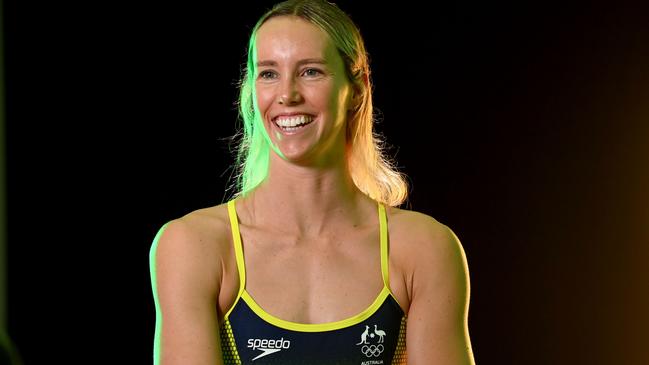
HM: Last one before I let you go and polish your medals. When it’s all done, I know you’re studying, and I know you’ve said you want to be a dolphin trainer. What is it that you think you’ll end up doing?
EM: I don’t know yet. I’ve finished my university degree in Health Promotion and Public Health Nutrition. I’ve never had any work experience, so I haven’t had a go at trying different things and seeing what I want to do. I’m still swimming, and I’m still passionate about it. I want to work with disadvantaged populations in Australia as well.
HM: You’re sort of the perfect human!
EM: (laughs) Ha … I’m not!
HM: Quick fire … What would you like to eat a lot of that you can’t?
EM: I eat whatever I want – I’m lucky!
HM: Because you are training so much, you can eat anything?
EM: Yeah – if I want junk food, I’ll eat it. I like a healthy diet, but if I’m craving something, I’ll have it. I don’t restrict myself at all. Hot chips are a favourite!
HM: Movie you have watched the most in your life?
EM: This isn’t a movie, but I’ve watched a lot of Friends.
HM: The song you would have played most on the iPod over the last twelve months?
EM: Lately I’ve been listening to a lot of Billie Eilish.
HM: Favourite tune?
EM: Your Power.
HM: I spoke to my mum this morning – “I’ve got to go, I’m about to speak to Emma McKeon”. She said, “Well, tell Emma that she should be unbelievably proud of the way she swum, but more importantly, the person she is. If I had a daughter, I’d hope she’d be half the young lady Emma is.”
EM: That’s nice. That makes me feel good. Thank her for me!
HM: I will.




